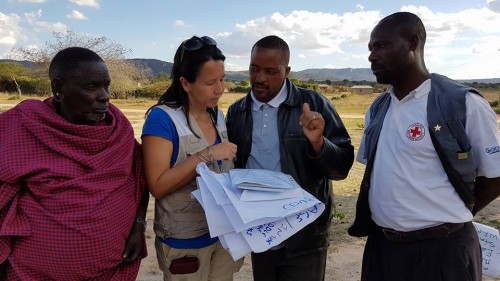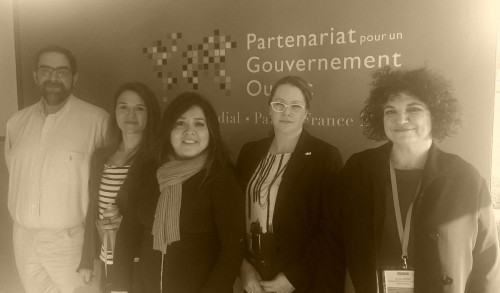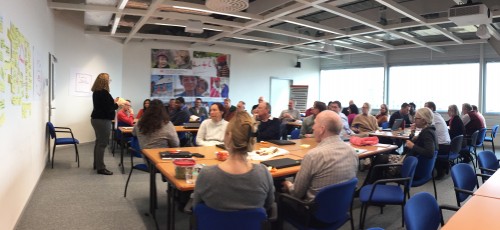[ed. note: Data @ IFRC is a blog series to share highlights from data-driven Red Cross Red Crescent national societies, learning opportunities and thought pieces on all things data from ethics to evidence.]
December is full of data – not enough sleep, all the deadlines and mountains of details. This dispatch of Data @ IFRC will cover examples of new data uses across the Federation, some insights from global events and, of course, some resources/reading.
Participatory Video
Often when we consider ‘data collection’, we tend to focus on math and stats. Data comes in all sizes and shapes. While there is some debate about how to weigh qualitative and quantitative data, we are a humans first organization. My colleague Miki Tsukamoto is piloting a project on Participatory Video for Evaluation in Ndaleta, Tanzania. This project was done in collaboration with the communities, a Participatory Video team and the Tanzania Red Cross Society.

(Photo via Miki Tsukamoto, IFRC)
We also have some great practices in community engagement for local voices. As we consider how to share the data journey @ IFRC, it will mean demonstrating impact with stories and data bits. To us, they go hand and hand.
Maps for Climate Change and the SDGs
It was my pleasure to chair a panel at the Open Government Partnership all about Open Mapping. The session focused on how maps could make a difference in cities by illustrating examples from community engagement, mapping business, opensolarmap as well as sharing how mapping electricity could help.
The outcome of this session was to demonstrate that by involving the community in mapping, we can city-build together to achieve our SDG goals but that civil society, organizations, governments and business will need to collaborate.

(photo of Christian Quest, Christina Franken, Miriam Gonzalez, Heather Leson and Davida Wood.)
Thanks to the panelists for a dynamic conversation.
Building Data Literacy Networks
At IFRC, there are many data leaders and data curious. We hosted an informal Data Working group session to talk about what people want to learn/share. We also identified some opportunities and barriers. Often when people talk about ‘data literacy’, they leap to IT or data science. We aim to build inclusive which is why I was delighted to have a wide range of participants from HR, the Library, IT, Health, Emergency Response and my colleagues from Policy, Strategy and Knowledge. Together we determined a roadmap for skillshares and plans to help each other on our data-driven innovation journey.

(photo via heather)
What is IATI?
IFRC Signed the Grand Bargain agreement. This means that we are researching how we can work with the International Aid Transparency Initiatives Standards. This video is a good starting point to understand the project:
What is Data Protection?
Colleagues at the International Committee of the Red Cross (ICRC) hosted a Webinar on Data Protection. This was co-hosted by the Professionals in Humanitarian Assistance and Protection (PHAP). They are seeking feedback for revised Data Protection Standards.
“The purpose of the standards, initiated and led by the International Committee of the Red Cross (ICRC) and involving several humanitarian and human rights NGOs and UN agencies, is not to provide a ‘how-to’ guide for practitioners but, rather, to establish a living body professional standards informed by international law, professional ethics, good practice, and operational reality.”
You can review the webinar here.
Winter Reading
- As we build data-driven innovation, we do need to be mindful on the ‘bright and dark sides’ of algorithms. I like to say that data corrupts humans, humans corrupt data. Hat tip to Alex Howard for sharing this paper: “The Tyranny of Data? The Bright and Dark Sides of Data-Driven Decision-Making for Social Good” (Academic Paper)
- “Big Data for Development and Humanitarian Action: Towards Responsible Governance” (report from UN Global Pulse)”
- I’m A Data Guy And I Don’t Get Why Everyone’s Obsessed With Data (article)
You don’t have to be a data scientist to innovate with data.
This really rings true as I look around at the activities across the Red Cross Red Crescent movement. Small data and data skills are among us. Plus we have many diverse skills that could complement the existing knowledge in house. We will need to be ready for data science, especially in the Information Management roles, but there are other ways to innovation. Colleagues over at UNDP have been doing great work:
“Data innovation is the use of new or non-traditional data sources and methods to gain a more nuanced understanding of development challenges.”
See the report with some tactics to activate your projects.
*****
(Note: Data @ IFRC will take a winter’s nap to catch up on reading. See you in January.)